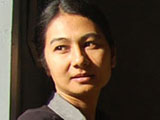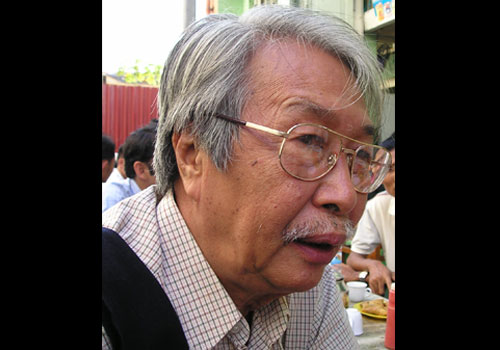Maung Moe Thu: A Happy Man
The secret to a happy life is simple, but hard to follow
Maung Moe Thu is an important figure in my life, as he is the one who convinced me to become a journalist when I had always considered myself to be a writer of poetry and short stories. I call him Ba Ba (Great Uncle). When he worked as chief editor at the magazine DANA (Wealthy) he asked me to write cover stories and news features. I immediately answered, “I don’t know how to write journalism.” But he told me, “Write the way you write. We don’t have any journalism schools in Burma.” His response gave me the confidence and the strength to write as a journalist.

- In Burma if you want to hear about issues the newspapers can’t talk about, you should go to a tea shop. Tea houses were where I used to meet with other activists, writers and artists, as well as where I built friendships. Within tea houses we talked about Burmese writers, literary trends we noticed, and, of course, politics. This online space attempts to emulate the conversations I enjoyed in Rangoon’s tea houses.

- Khet Mar is a journalist, novelist, short story writer, poet, and essayist from Burma. She is the author of one novel, Wild Snowy Night, as well as several collections of short stories, essays and poems. Her work has been translated into English and Japanese, been broadcast on radio, and made into a film. She is a former writer-in-residence at City of Asylum/Pittsburgh.
Maung Moe Thu started writing poetry when he was a university student. In 1959, he worked as an editor for the journal Khit (Era) and the newspaper Man Khit (Madalay Era). He is also a publisher and has translated twenty-seven novels from English into Burmese. In the 1970s he was a screenwriter and directed twelve feature films.
When he was twenty he became vice chairman of a student union at Mandalay University calling for student rights, which resulted in his being detained for 10 months in 1958. Later, after the 1988 uprising in Burma, he co-founded the National League for Democracy Party (NLD) with Aung San Suu Kyi. Because of his activities in the NLD, he was arrested in 1989 and sentenced to three years in prison. In 1996 he was arrested again and sentenced to four years imprisonment. His wife died in 1999 while he was in jail, before he was eventually released in 2000.
Since then Maung Moe Thu has mainly written and worked as a chief editor for publications like DANA, Perfect Magazine, Kalyar, Modarn Journal, and Kumudra Journal.
Maung Moe Thu treats people warmly and people love him. He welcomed me after I came from a rural area to begin writing, so I became very close to him—especially when I wrote for his magazine. Whenever I had a problem, I would go to his home and discuss my feelings with him. He listened carefully and encouraged me every time. Once he told me something I’ll always remember: “Always say the truth and face it whenever you have a problem. It’s the easiest way to solve it.”
The entire time I worked with him I never saw Maung Moe Thu depressed. He is always active and happy. Even though he was jailed many times for fighting for human rights, student rights, and for freedom of expression, he has never spoke of how he suffered during those times. Whenever he was asked about his experiences in jail, he always answered with a sense of humor. I constantly try to emulate his optimistic way of living.
Now he is 75. When I called him in late August, I heard the sound of laughing and teasing on the phone. Some young writers who love him were there, as usual. I asked Maung Moe Thu, who is happy with young people from the world of literature, “Why do people love you and why you are always so happy?”
“If your mind is pure, people will love you. It might also be because of my commitment to helping people around me and because I have helped people as much as I could. Because I am trying to help people, people love me. Because people love me, I am happy,” he replied.
I have often seen elderly people who are lonely and depressed. Maung Moe Thu is still active and happy. I need to work on helping people like he does to be happy when I am his age. While talking with him on phone I began thinking that the secret to a happy life is both very simple and very difficult to follow.
Translation: Courtney Wittekind






One Comment on "Maung Moe Thu: A Happy Man"
Terrific article about an inspiring man. I saw him this past month in Yangon, and agree completely with your assessment. He brings so much joy and insight to writing and to humanity.